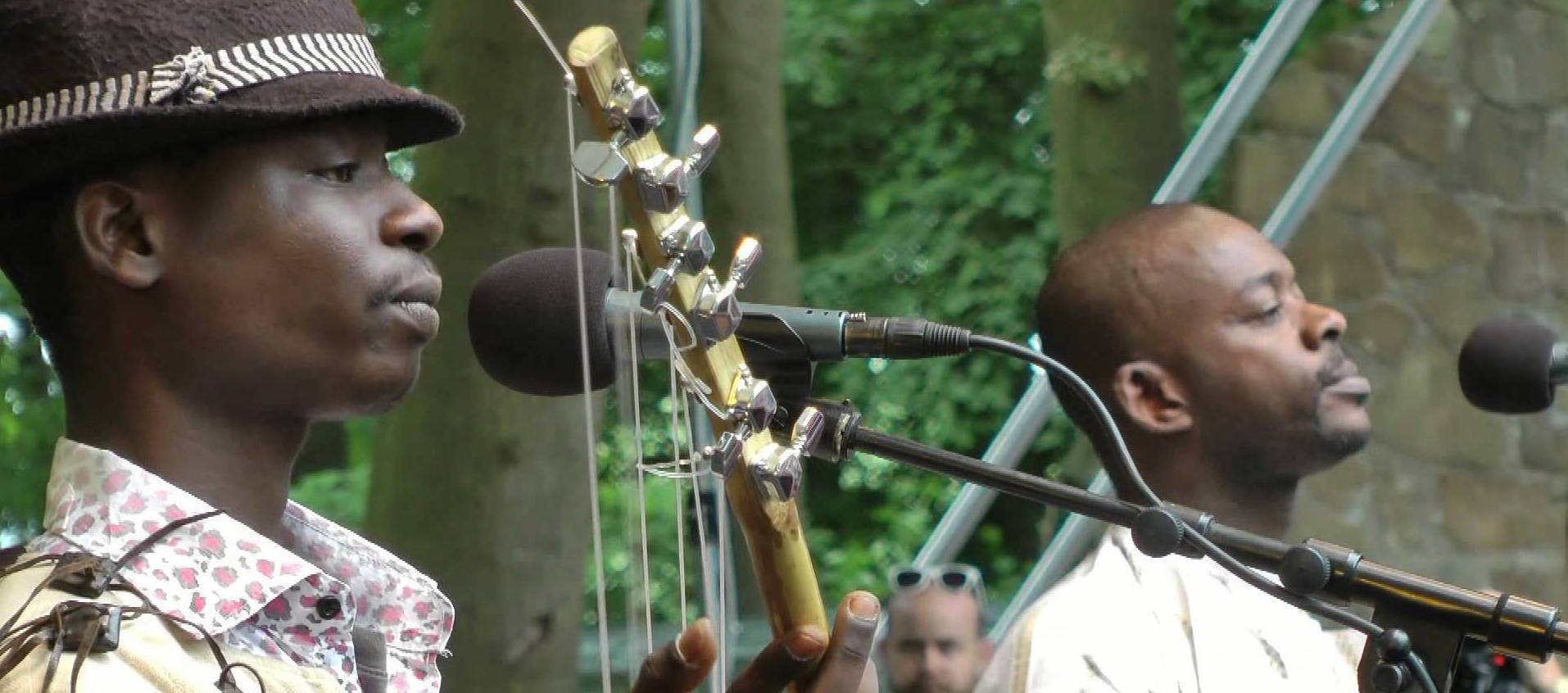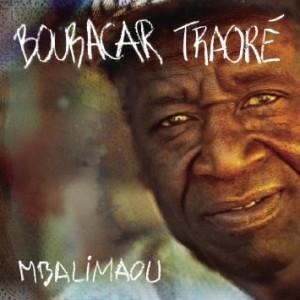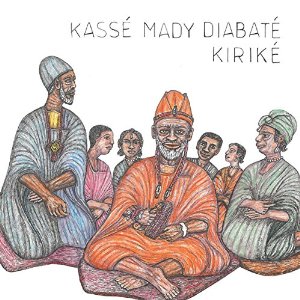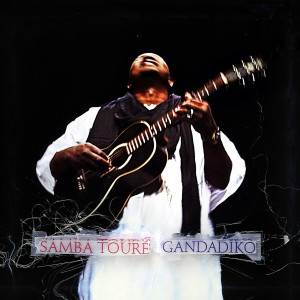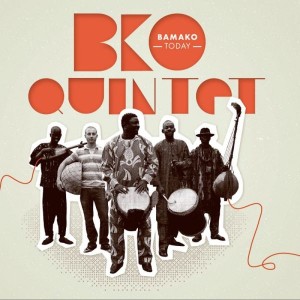Mali has suffered through three years of political instability and tension, with serious consequences for musicians’ livelihoods, not only in the troubled north but in the capital, Bamako. And all that comes on top of the collapse of the recorded music industry worldwide, vicious local music piracy, and the garden variety challenges of being a musician in a poor African country. But if times are harder in Mali than they’ve been in a long while, you wouldn’t know it from the country’s recorded musical output on the international market. The year has barely begun, and already we have four fine titles from both veterans and newcomers in Mali.
First, singer-songwriter-guitarist Boubacar Traoré—A.K.A. Kar Kar—is now 73. Mbalimaou (Lusafrica) is his 10th album since he emerged from obscurity in 1990. Traoré originally made his name as a twist-era booster of the new, independent Mali back in 1960. But after his wife died during childbirth, he left music behind for many years before beginning the second-life career Afropop fans remember since 1990. That second career began with a wistful lament called “Mariama,” and an album by the same name. Traoré revisits this song here with undiminished feeling, his clear tenor gliding through the song’s long sustained tones supported by meandering harmonica riffs played by Vincent Bucher, a French veteran of many Malian recordings. The instrumental backing on Mbalimaou is focused and economical, with Traoré’s gently cycling guitar vamps interwoven with swells of harmonica, bright patches of traditional lute and fiddle riffing, and elegant kora parts played by the album’s co-producer, Ballaké Sissoko. The ensemble plays briskly, especially on uptempo numbers like the opener “Dounia Djanjo” and the bluesy “Bembalisso.” The waltz-like instrumental “Bouboudani” is also a high point. At times we sense a certain weariness in Traoré’s voice, well earned. But Kar Kar’s appeal was never based on vocal polish or theatrics, rather on character—and that he still delivers persuasively. Today, Habib Koite, Rokia Traoré and other young singers adapt Mali’s ethnic tradition without being trained in or beholden to any one. In a sense, Kar Kar was ahead of his time when he did this back in the 1960s. Still in the game, he marks half a century of change, an emblem of Mali’s adaptive and tenaciously enduring music culture.
When it comes to Mande griot vocalist Kasse Mady Diabaté and his latest release, Kiriké (Six Degrees), we’re talking deep tradition. We’re also talking phenomenal vocal prowess. This is Kasse Mady’s sparest and most intimate recording ever. The session is all acoustic, featuring just four support musicians including Ballaké once again on kora and his collaborator from the duo Chamber Music, Vincent Segal, on cello. The set opens with “Simbo,” a new version of one of Kasse Mady’s signature traditional songs, “Koulanjan.” This gentle, relaxed read announces the album’s mode: stately, poised renditions of bedrock griot songs. There’s little flashy playing here, and Kasse Mady mostly holds off the full-gale belting we all know he’s capable of, favoring instead a silken calm and highly personal performances: Truly the work of a master. “Sadjo” takes the formula to its extreme with Kasse Mady practically whispering the familiar melody of the lament “Mali Sadjo,” backed only by the lightly buzzing balafon of Lansine Kouyate. The repertoire may be familiar, and the arrangements deceptively simple, but this is Kasse Mady as we’ve almost never heard him, completely stripped of artifice, and quite awesome to behold.
Then we come to some younger players on the Mali scene. Samba Toure is not exactly a newcomer, having toured as support guitarist to Ali Farka Toure back in the early 2000s. He’s since produced a number of solo albums that work from the starting point of Sonrai music and the sounds of the Malian north. The new Gandadiko (Glitterbeat), offers an adventurous extension of Toure’s range, with nods to influences as diverse as Serge Gainsbourg and Bo Diddley. Toure is a strong guitarist whether picking and strumming on acoustic or laying into distorted, rock-tinged volleys of electric lead. His singing is effective, not spectacular. Like his mentor Ali Farka, he’s comfortable with smoldering ballads that feel a lot like slow blues numbers—“Malè Bano” and “Gafouré.” But “Su Wililé” with its spot-on Bo Diddley guitar vamp, is downright playful. Toure is part of a new posse of versatile guitarist/singer/songwriters out of northern Mali—Oumar Konate, Ananse Cissé, Baba Salah, Vieux Farka Toure and others. It’s become yet another identifiable Malian sub-genre.
Finally, a brand-new group, BKO Quintet, debuts a CD/DVD package called Bamako Today (Maraka/Buda, out on March 10). All four of these new releases were created in the midst, or the wake, of Mali’s turbulent recent history. The extent to which they address that history is hard to evaluate, as none of these releases provide lyric translations. But BKO Quintet literally formed and made their first recordings amid crisis, and whatever the song lyrics might say, these performances exude a sense of urgency. The ensemble creates an engaging blend of rural and urban sensibilities. Prominent in the mix is the sound and feel of hunters' music, with the heavy thrumming tones of the donsongoni (hunters’ harp) played by Nfali Diakite, who adds rap-like incantations that evoke ancient days when hunters were the storytellers and reporters of their village societies. At the same time, we have the sharp, nimble sound of the djelingoni (Abdoulaye Kone and Mbaba Sissoko) and portentous blasts of Mande griot oratory from Fassara Sacko. This group’s claim to be the first ever to combine hunters' and griot culture is a stretch. (The Rail Band did that in the 1970s.) But BKO Quintet embraces this idea with gusto, focus and bristling energy. “Djelike” unfolds within the infectious, deep-swaying lope of Wassoulou music, only with griot ngoni riffing with that electric sawtooth edge we first heard from Bassekou Kouyaté and Ngoni Ba. (Now it’s just part of the language for young griots in Bamako.) After some spitfire hunters' wisdom, the vocals turn melodic, all set up for the full-on vocal blare from Sacko—recorded with the sound of a street wedding, as if through a megaphone. Nice. These are smart arrangements, created by combining sounds Mali music fans know well and adding a few surprises, like globe-trotting singer/songwriter Piers Facini who glides in with a gentle, English-language passage amid the slow grind of a hunters’ procession (“Donsolu”). Producer David Kledjian goes for a gritty sound that will sit well with fans of Tinariwen, Zani Diabaté or Lobi Traoré, early Malian rockers. The performances here are strong, and the music is often beautiful, though not pretty. This is a world apart from the courtly musings of Kasse Mady, yet the two sounds are plainly connected. BKO Quintet is young and keen on new ideas, but, like all four of these releases, their album falls easily within the inclusive genre that is Malian tradi-moderne—roots music with a twist. No doubt, wilder, woolier fare is being cooked up in Bamako’s recording studios this year, from cellphone balafon trance grooves to stadium-packing rap posses. We’ll get to those. But this is not a bad start from a country many people—with some reason—take to be truly down and out.







